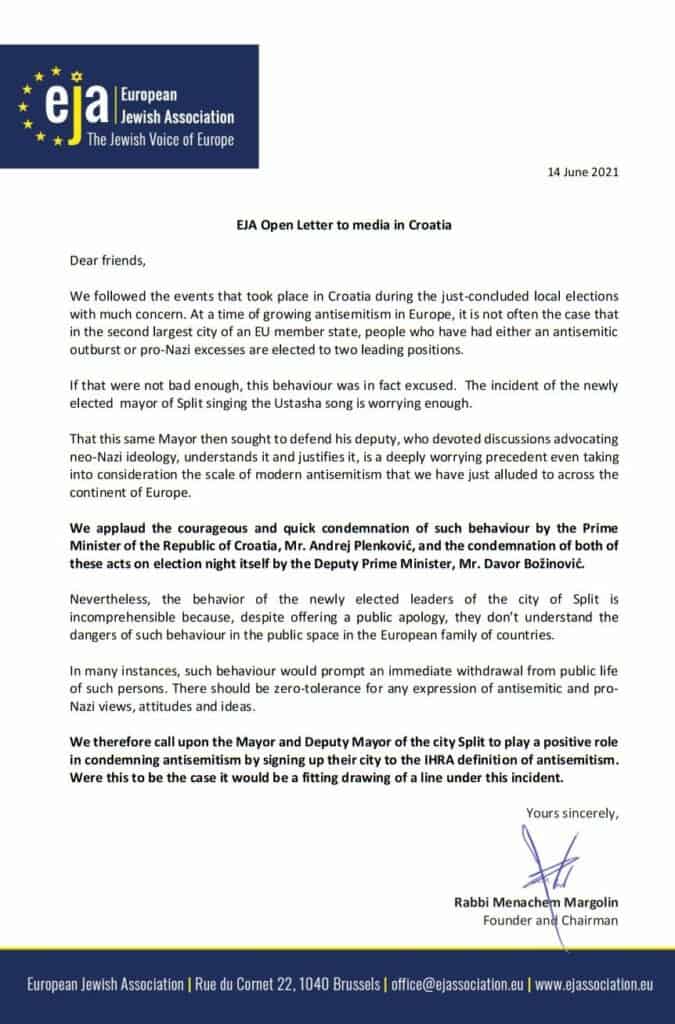(JTA) — El sentimiento antisemita prevalece especialmente en Italia y Hungría, según múltiples encuestas. Pero un índice único en su tipo que combina diferentes medidas de la experiencia judía encontró que también son los mejores países europeos para que vivan los judíos.
CNAAN LIPHSHIZ
El índice, presentado el lunes, se basa en un estudio que combina datos de encuestas e información de políticas para crear una métrica única de calidad de vida para los judíos en los 12 países de la Unión Europea con comunidades judías considerables, según Daniel Staetsky, estadístico de la Institute for Jewish Policy Research, con sede en Londres, que escribió el informe para la Asociación Judía Europea en Bruselas.
“El objetivo de este informe es tomar los excelentes datos que ya tenemos sobre cómo se sienten los judíos, sobre qué tan prevalente es el antisemitismo, y combinarlos con las políticas gubernamentales medibles”, dijo Staetsky durante una conferencia celebrada por la Asociación Judía Europea en Budapest.
Dijo que los resultados pueden desafiar las ideas preconcebidas sobre qué países de la UE son más hospitalarios con los judíos. Por ejemplo, Alemania obtuvo una puntuación alta en lo que respecta a las políticas gubernamentales relacionadas con los judíos. Pero los judíos allí reportan una débil sensación de seguridad, lo que lleva a una puntuación general media.
El índice es principalmente una herramienta “para exigir acciones concretas de los líderes europeos”, dijo el rabino Menachem Margolin, director de la Asociación Judía Europea. “Damos la bienvenida a las declaraciones contra el antisemitismo de los líderes europeos. Pero se necesita algo más que declaraciones”.
La Asociación Judía Europea hará recomendaciones individuales a cada país encuestado, agregó Margolin en el evento de prensa. Fue parte de un evento de dos días patrocinado por múltiples organizaciones judías, incluido el Consistoire en Francia, la Agencia Judía para Israel y el gobierno israelí, sobre cómo las comunidades judías europeas pueden ayudar a la de Ucrania.
Titulado “Europa y los judíos, un índice de país de respeto y tolerancia hacia los judíos”, el estudio otorga a Bélgica, Polonia y Francia las puntuaciones más bajas con 60, 66 y 68 puntos sobre 100, respectivamente. Los tres primeros países tienen 79, 76 y 75 puntos, seguidos de Gran Bretaña y Austria (75), Países Bajos, Suecia, Alemania y España (74, 73, 72, 70).
Para elaborar el ranking, Staetsky otorgó calificaciones a cada país encuestado en múltiples temas, incluido el sentido de seguridad judío, las actitudes públicas hacia los judíos y la cantidad de judíos que dijeron que habían experimentado antisemitismo. Las calificaciones se basaron en las principales encuestas de opinión de los últimos años, incluidas las realizadas por la Liga de Acción y Protección, un grupo que monitorea los crímenes de odio contra los judíos en varios países europeos, y la Agencia de Derechos Fundamentales de la Unión Europea.
El estudio combinó esos puntajes con los puntajes que el autor le dio a las políticas gubernamentales de los países, incluida su financiación para las comunidades judías, si habían adoptado una definición de antisemitismo y el estado de la educación sobre el Holocausto y la libertad de culto.
Bajo ese sistema de puntaje, Alemania recibió un puntaje general de 72 a pesar de tener el mejor puntaje (89) en el desempeño del gobierno en temas relacionados con los judíos y un sólido 92 en lo que respecta a la prevalencia del antisemitismo. Pero una puntuación relativamente baja en el sentido de seguridad de los judíos (46) perjudicó su puntuación general, entre otros factores.
En el caso de Hungría, “el puntaje que recibió refleja la realidad sobre el terreno”, según Shlomo Koves, jefe del grupo paraguas de comunidades judías en Hungría EMIH, afiliado a Chabad. “Los judíos pueden caminar por aquí, ir a la sinagoga, sin el menor temor al acoso”, dijo.
Pero la prevalencia de sentimientos antisemitas en la sociedad húngara (una encuesta de la Liga Antidifamación de 2015 encontró que alrededor del 30% de la población los tiene) “muestra que también hay trabajo por hacer aquí, en educación y divulgación”, dijo Koves.
https://www.enlacejudio.com/2022/06/21/respuestas-inesperadas-sobre-los-mejores-paises-europeos-para-los-judios-estudio/amp/















